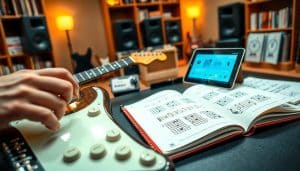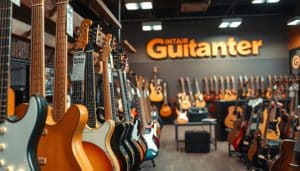If you’re a guitarist looking to enhance your sound with a bass amp, you’ve come to the right place. In this ultimate guide, we’ll explore everything you need to know to find the best bass amp for your guitar. From understanding different types of amps to examining important features and considering budget considerations, we’ll equip you with all the knowledge you need to make an informed decision. So get ready to take your guitar playing to the next level with the perfect bass amp!

Understanding Bass Amps
What is a bass amp?
A bass amp is an essential piece of equipment for any bass guitarist. It is specifically designed to amplify the low-frequency sounds produced by the bass guitar. A good bass amp not only enhances the tone and volume of the instrument, but also provides clarity and articulation to the bass notes.
Why do you need a bass amp for guitar?
While it is technically possible to plug a bass guitar into a regular guitar amp, using a dedicated bass amp is highly recommended. The frequencies produced by a bass guitar are significantly lower than those produced by a regular guitar, and a bass amp is built to handle these lower frequencies more effectively. Using a bass amp ensures that you get the best sound quality and prevents damage to the amp and speakers.
The difference between a bass amp and a guitar amp
The main difference between a bass amp and a guitar amp lies in the way they handle frequencies. A bass amp is designed to emphasize the low-end frequencies, allowing the bass guitar to be heard clearly in the mix. On the other hand, a guitar amp is optimized for the mid-range frequencies, which helps to bring out the distinctive tones of a guitar. Using the wrong type of amp can result in distorted and muddy bass tones, making it crucial to use a dedicated bass amp for optimal sound quality.
Factors to Consider
Power
The power rating of a bass amp is an important factor to consider. The power, measured in watts, determines the volume and headroom of the amp. If you primarily play in smaller venues or for personal practice, a lower wattage amp will suffice. However, if you perform in larger venues or with a band, a higher wattage amp will be necessary to cut through the mix and provide sufficient volume without distorting the sound.
Speaker Size
The speaker size of a bass amp directly affects the low-end response and overall tone. Larger speakers, such as 15-inch or 18-inch, produce a deeper and more resonant bass tone. Smaller speakers, such as 10-inch or 12-inch, provide a tighter and punchier sound. The choice of speaker size depends on personal preference, playing style, and the type of music you play.
Tone Controls
A bass amp’s tone controls, such as bass, mid, and treble knobs, allow you to shape and sculpt your sound. These controls enable you to emphasize or attenuate specific frequencies, giving you the flexibility to achieve your desired tone. Some bass amps also feature additional tone-shaping options, such as graphic EQs or contour controls, which provide even more control over your sound.
Portability
The portability of a bass amp is an important consideration, especially if you frequently travel or gig. Smaller combo amps or lightweight head and cabinet setups are more portable and easier to transport. However, keep in mind that larger amps often provide more power and better low-end response. It’s essential to strike a balance between portability and the sound quality you require for your specific playing situations.
Price
Price is always a factor when purchasing any piece of gear. Bass amps come in a wide range of prices, from budget-friendly options to high-end professional models. Determine your budget range beforehand and consider the features and quality you need. Remember that investing in a good bass amp is an investment in your sound, so it’s worth prioritizing quality and durability over cost.
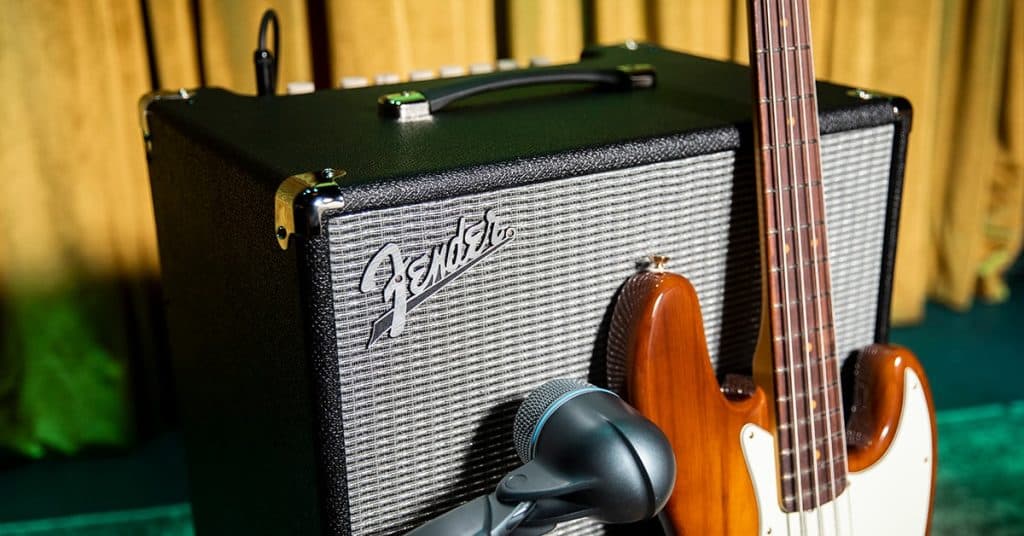
Different Types of Bass Amps
Combo Amps
Combo amps combine a speaker and amplifier in a single unit, making them compact and easy to use. They are popular among bassists, especially for personal practice or small gigs. Combo amps are available in various wattage options, speaker sizes, and feature sets to suit different playing needs and preferences. They are a convenient option for those who value simplicity and portability.
Head and Cabinet Amps
Head and cabinet amps offer more flexibility and customization options. The head houses the amplifier and controls, while the cabinet contains the speakers. This setup allows you to mix and match different heads and cabinets, tailoring your sound to your exact specifications. Head and cabinet amps are suitable for intermediate to advanced players who require more power and tone-shaping possibilities.
Stacked Amps
Stacked amps consist of multiple speaker cabinets stacked vertically. This setup provides a powerful and impressive stage presence, as well as a wider sound dispersion. Stacked amps are typically used in larger venues and by professional bassists who need exceptional volume and projection. While they may not be suitable for every player or situation, stacked amps can deliver the punch and clarity required in a band setting.
Practice Amps
Practice amps are designed for home use and personal practice sessions. They are usually small in size and low in wattage, making them ideal for quiet playing. Practice amps often feature headphone outputs for silent playing, auxiliary inputs for playing along with backing tracks, and built-in effects to enhance the practice experience. While they may not have the power or volume for live performances, practice amps are excellent companions for honing your skills in a private setting.
Popular Bass Amp Brands
Ampeg
Ampeg is a legendary brand known for its iconic bass amplifiers. They have been producing high-quality bass amps since the 1960s and have become a favorite among professional bassists. Ampeg amps are revered for their warm and full-bodied tone, rugged construction, and reliable performance. Whether you need a small practice amp or a powerful touring rig, Ampeg offers a wide range of options to suit every player’s needs.
Fender
Fender, a renowned name in the guitar world, also offers a range of bass amps that are highly regarded by bassists. Fender bass amps are known for their classic aesthetics, vintage-inspired tone, and versatility. They offer a variety of models, from compact combo amps to powerful head and cabinet setups. Fender amps are trusted by bassists of all genres and skill levels, making them a reliable choice for any player.
Gallien-Krueger
Gallien-Krueger (GK) is a brand that has gained a strong reputation in the bass amp market. Their amps are widely recognized for their cutting-edge technology, powerful sound, and lightweight design. GK amps offer a range of features, including advanced EQ controls, bi-amping capabilities, and built-in effects. They are favored by many professional bassists who require top-notch performance and versatility.
Orange
Orange is known for its distinctive and visually striking amplifiers, and their bass amps are no exception. Orange bass amps are revered for their bold and dynamic tone, exceptional build quality, and unique design. They offer a variety of models, from compact combo amps to larger head and cabinet setups. Orange amps are often favored by bassists who play rock, metal, or other genres that require a powerful and aggressive sound.
Markbass
Markbass is a brand that has gained popularity among bassists for its compact and lightweight amp designs. Markbass amps are specifically designed to offer portability without sacrificing tone and power. They are known for their transparent and natural sound reproduction, enabling bassists to fully express the nuances of their playing. Markbass offers a range of models to suit different playing styles and needs, making them a popular choice for gigging musicians.
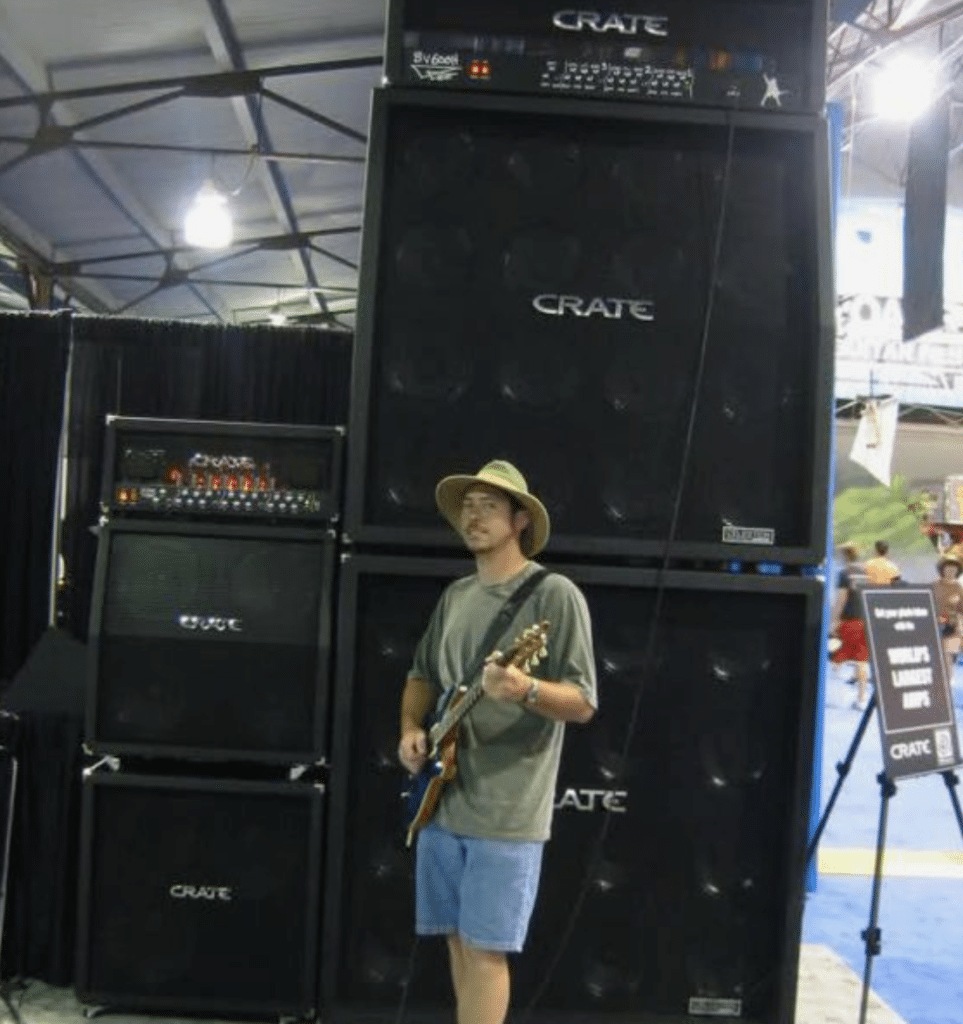
Choosing the Right Wattage
Considering your playing environment
When choosing the wattage of your bass amp, consider the venues and environments you will be playing in most frequently. If you primarily play in small clubs or practice at home, a lower wattage amp will suffice. On the other hand, if you play in larger venues or with a loud band, a higher wattage amp is necessary to provide enough volume and headroom to cut through the mix.
Determining the size of the venues you perform in
The size of the venues you perform in also plays a significant role in determining the right wattage for your bass amp. For smaller venues, such as coffee shops or small bars, a lower wattage amp will generally be sufficient. However, for larger venues, theaters, or outdoor gigs, a higher wattage amp is required to project your sound effectively to a larger audience.
Balancing power and portability
It’s important to strike a balance between power and portability when choosing the wattage of your bass amp. Higher wattage amps tend to be larger and heavier, making them less portable and suitable mainly for professional or touring musicians. If portability is a priority for you, consider a lower wattage amp or explore options with lightweight designs, such as Class D amplifiers.
Selecting the Ideal Speaker Size
Understanding the relationship between speaker size and low-end response
The speaker size of a bass amp directly affects the low-end response and overall tone. Larger speakers, such as 15-inch or 18-inch, produce deeper and more resonant bass tones. They are ideal for genres that require strong low-end presence, such as rock or reggae. However, it’s worth noting that larger speakers may result in a bulkier and heavier setup.
Smaller speakers, such as 10-inch or 12-inch, provide a tighter and punchier sound with enhanced mid-range presence. They are well-suited for genres that demand precision and articulation, like jazz or funk. Smaller speakers are generally more compact and lightweight, making them an attractive option for gigging musicians who prioritize portability.
Considering the size and type of venues you play
The size of the venues you regularly perform in should also be taken into account when selecting the speaker size of your bass amp. For smaller venues or intimate settings, a combo amp with a single 10-inch or 12-inch speaker may suffice. However, for larger venues or situations where you need more volume and projection, a larger speaker or a multiple-speaker cabinet setup could be the better choice.
It’s also important to consider the type of venues you play in. If you frequently perform in venues with good acoustics or an in-house sound system, you may not need a larger speaker size to fill the space. However, if you often find yourself playing in venues with poor acoustics or without a PA system, a larger speaker size can ensure your bass carries well throughout the room.
Determining the desired level of portability
Ultimately, your desired level of portability will influence the speaker size you choose. If you prioritize portability and are constantly on the go, opting for a bass amp with a smaller speaker size or a lightweight combo amp can make transportation much more manageable. However, if sound quality and projection are your top priorities and you have the means to transport a larger setup, a larger speaker size can offer a more satisfying low-end response.
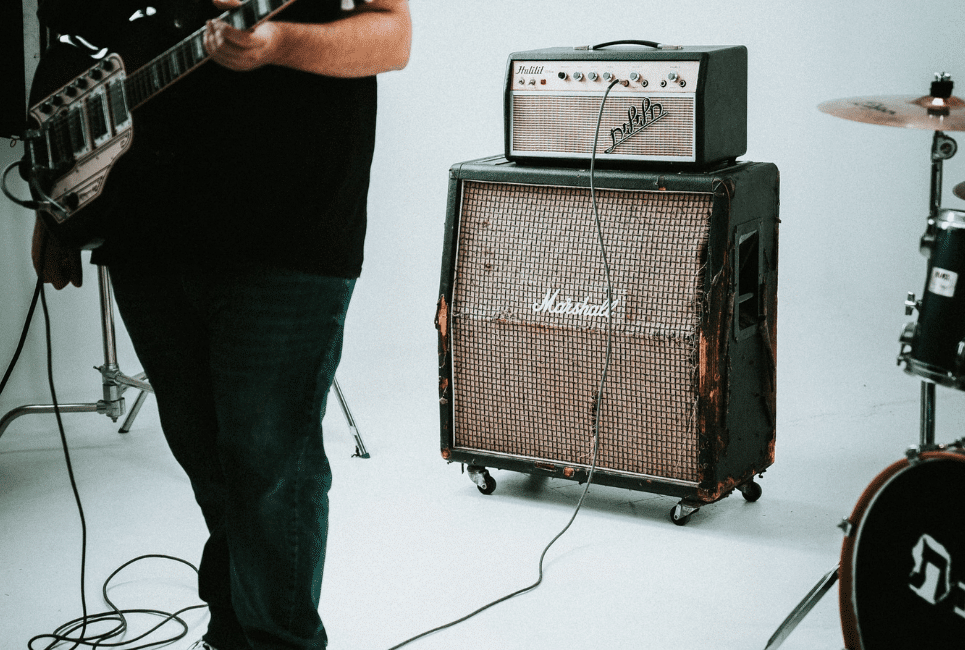
Exploring Different Tone Controls
Understanding the importance of EQ controls
Tone controls play a crucial role in shaping your bass sound to suit your playing style and musical preferences. EQ (Equalization) controls allow you to adjust the levels of bass, midrange, and treble frequencies independently. With these controls, you can emphasize certain frequencies to add warmth, cut through the mix, or achieve the desired tonal balance. A bass amp with comprehensive tone controls can help you sculpt your sound precisely to your liking.
Common tone controls found in bass amps
Most bass amps feature basic tone controls such as bass, mid, and treble knobs. These controls allow you to boost or cut specific frequency ranges to shape your overall tone. The bass control, as the name suggests, adjusts the low-end frequencies. The mid control affects the midrange frequencies, which can greatly influence the clarity and presence of your bass sound. The treble control adjusts the high-end frequencies, allowing you to add brilliance or tame any harshness in your tone.
Some bass amps may offer additional controls, such as a presence knob, which adds clarity and definition to your sound. Graphic EQs provide even more control by allowing you to adjust specific frequency bands with sliders. Contour controls offer a one-knob solution to quickly shape your tone, often emphasizing the midrange frequencies for increased punch and presence. These additional tone controls can greatly enhance your ability to shape your sound to suit different musical styles and playing situations.
Features like built-in effects and additional EQ options
In addition to the standard EQ controls, many bass amps come with built-in effects and additional EQ options. Built-in effects can include compression, overdrive, chorus, or reverb, allowing you to add character and depth to your bass sound without the need for additional pedals. Some amps also offer advanced EQ options, such as parametric EQs, which provide even more precise control over specific frequency ranges. These features provide increased versatility and convenience, enabling you to tailor your sound to a wide range of musical styles and genres.
Considering Portability
Assessing your need for portability
When choosing a bass amp, it’s crucial to assess your need for portability. If you primarily perform in smaller venues, travel frequently, or have limited physical strength, a more portable and lightweight option should be a top priority. Consider combo amps or head and cabinet setups with lightweight materials, such as neodymium speakers or Class D amplifiers. These options offer excellent sound quality without sacrificing portability, making them ideal for gigging musicians.
Weight and size considerations
Weight and size are key factors to consider when evaluating the portability of a bass amp. Lightweight amps are easier to carry and transport, especially if you need to navigate through staircases, tight spaces, or public transportation. Combo amps or smaller head and cabinet setups generally offer better portability due to their compact size and reduced weight.
However, it’s important to balance portability with your desired sound quality and playing requirements. While larger amps may be heavier and bulkier, they often provide more power, better low-end response, and greater projection. If you prioritize sound over convenience, a larger amp may be worth the extra effort to transport.
Additional features for easy transportation
Some bass amps offer additional features specifically designed to enhance portability. Features like recessed handles, caster wheels, or a lightweight construction can make a significant difference in ease of transportation. Recessed handles make carrying the amp more comfortable and reduce the chances of accidental damage during transport. Caster wheels allow you to roll the amp instead of carrying it, making it easier to maneuver through different environments. Always consider these additional features to ensure that your chosen bass amp meets your requirements for portability.
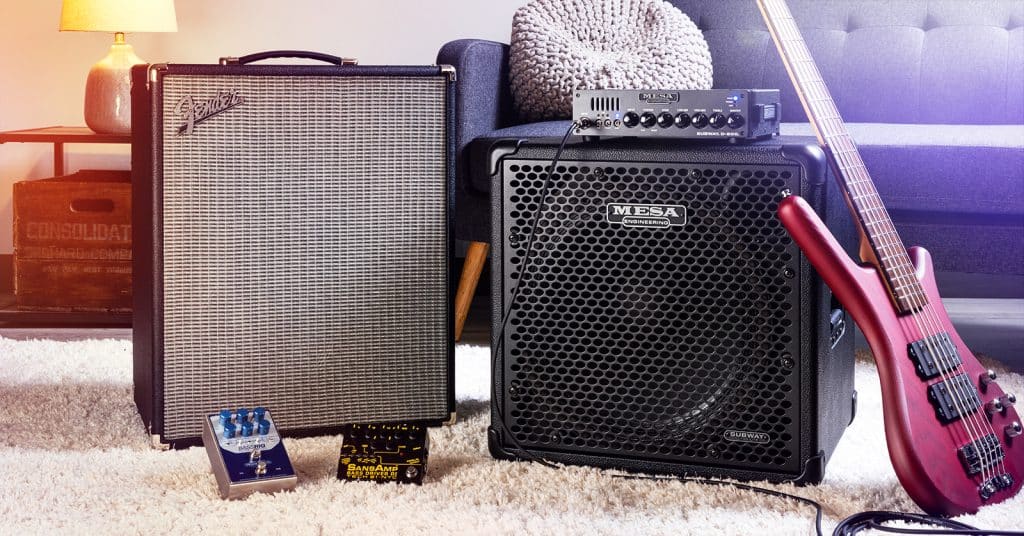
Determining your Budget
Setting a budget range
Setting a budget range is important before diving into the process of buying a bass amp. Determine the maximum amount you are willing to spend and try to stick within that range. Keep in mind that higher prices often mean better overall quality, durability, and performance. However, there are also budget-friendly options available that provide decent sound quality and functionality. It’s essential to find a bass amp that strikes a balance between meeting your specific needs and fitting within your budget.
Comparing prices and features
To make an informed decision, compare the prices and features of different bass amps within your budget range. Consider the wattage, speaker size, tone controls, and additional features each amp offers. Prioritize the features that are most important to your playing style and musical requirements. Keep in mind that higher-priced amps often provide better sound quality, construction, and durability, so investing in a higher-end model may be worth it in the long run.
Finding the best value for your money
Finding the best value for your money involves considering a combination of factors, including price, features, performance, and durability. Look for a bass amp that offers the most bang for your buck, taking into account your specific needs and playing requirements. Reading reviews and seeking recommendations from fellow musicians can also be helpful in determining which amps provide the best value. Remember that a quality bass amp is an investment in your sound, so it’s worth investing in a reliable and durable option that will serve you well for years to come.
Reading Reviews and Seeking Recommendations
Researching online reviews and ratings
Before making a final decision, take the time to research online reviews and ratings of the bass amps you are considering. Online forums, review websites, and retailer websites often feature user reviews that provide valuable insights into the pros, cons, and overall performance of different models. Pay attention to reviews that align with your specific playing style and requirements. However, keep in mind that everyone’s preferences and experiences can vary, so it’s essential to read a variety of reviews to get a well-rounded perspective.
Seeking recommendations from fellow musicians
Seeking recommendations from fellow musicians, especially those who play bass, can be invaluable in the search for the best bass amp for your guitar setup. Ask for suggestions from friends, bandmates, or even local music stores. Bassists who have firsthand experience with different amps can offer valuable insights and recommendations based on their personal preferences and playing situations. Additionally, attending local gigs or open jams can provide opportunities to see and hear different bass amps in action, allowing you to assess their sound quality and performance.
Considering expert opinions and comparisons
Expert opinions from professional bassists, gear reviewers, and music industry publications can also provide a wealth of information when it comes to choosing a bass amp. Look for expert reviews, gear guides, or comparison articles that highlight the pros and cons of different models. These sources often provide technical details, sound samples, and analysis to help you make an informed decision. While expert opinions should be taken into consideration, remember that personal preference and your unique playing style should ultimately guide your choice.
By considering the factors mentioned above and doing thorough research, you can confidently select the best bass amp for your guitar. Remember to prioritize your specific needs, playing style, and budget to find an amp that enhances your sound and brings out the best in your bass guitar. Whether you’re a beginner or an experienced player, investing in a quality bass amp will elevate your playing experience and ensure that your tone shines through every performance.


